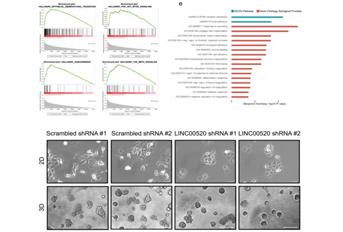Associação Portuguesa de Investigação em Cancro
O papel do lncRNA LINC00520 no desenvolvimento de cancro da mama
O papel do lncRNA LINC00520 no desenvolvimento de cancro da mama

Num esforço colaborativo de investigadores do Centro de Cancro do Beth-Israel Deaconess Medical Center e Harvard Medical School, que contou com a participação do medico investigador português Francisco Beça, actualmente faculty da Harvard Medical School, foram descobertos vários long non-coding RNA (lncRNAs) potencialmente implicados no desenvolvimento de cancro da mama.
No artigo publicado na revista Oncotarget, os autores reportam que o aumento de expressão do lncRNA LINC00520 é comum à transformação oncogénica da linha celular MCF10A quer pela v-Srv, quer pela PI3K. A sobre expressão de LINC00520 foi também observada num grupo de amostras de carcinomas da mama incluídos na base de dados The Cancer Genome Atlas (TCGA). Neste grupo, a sobre expressão de LINC00520 foi associada com o subtipo basal e com a expressão de genes de motilidade, adesão celular e inflamação. Os autores realizaram ainda estudos funcionais em que demonstraram que a depleção de LINC00520 resulta na redução da motilidade celular e capacidade de migração celular.
Esta descoberta reforça o potencial papel no desenvolvimento do cancro de mama desta classe de ácidos ribonucleicos longos não codificantes e em particular do lncRNA LINC00520.
Autores e afiliações:
Whitney S. Henry1,*, David G. Hendrickson2,3,*, Francisco Beca1,3, Benjamin Glass1,3, Marianne Lindahl-Allen4, Lizhi He4, Zhe Ji4, Kevin Struhl4, Andrew H. Beck1,3, John L. Rinn2,3 and Alex Toker1
1 Department of Pathology, Beth Israel Deaconess Medical Center, Harvard Medical School, Boston, MA, USA
2 Department of Stem Cell and Regenerative Biology, Harvard University, Cambridge, MA, USA
3 Broad Institute of MIT and Harvard, Cambridge, MA, USA
4 Department of Biological Chemistry and Molecular Pharmacology, Harvard Medical School, Boston, MA, USA
Abstract:
Long non-coding RNAs (lncRNAs) have been implicated in normal cellular homeostasis as well as pathophysiological conditions, including cancer. Here we performed global gene expression profiling of mammary epithelial cells transformed by oncogenic v-Src, and identified a large subset of uncharacterized lncRNAs potentially involved in breast cancer development.
Specifically, our analysis revealed a novel lncRNA, LINC00520 that is upregulated upon ectopic expression of oncogenic v-Src, in a manner that is dependent on the transcription factor STAT3. Similarly, LINC00520 is also increased in mammary epithelial cells transformed by oncogenic PI3K and its expression is decreased upon knockdown of mutant PIK3CA. Additional expression profiling highlight that LINC00520 is elevated in a subset of human breast carcinomas, with preferential enrichment in the basal-like molecular subtype. ShRNA mediated depletion of LINC00520 results in decreased cell migration and loss of invasive structures in 3D. RNA sequencing analysis uncovers several genes that are differentially expressed upon ectopic expression of LINC00520, a significant subset of which are also induced in v-Src-transformed MCF10A cells. Together, these findings characterize LINC00520 as a lncRNA that is regulated by oncogenic Src, PIK3CA and STAT3, and which may contribute to the molecular etiology of breast cancer.
Revista: Oncotarget




